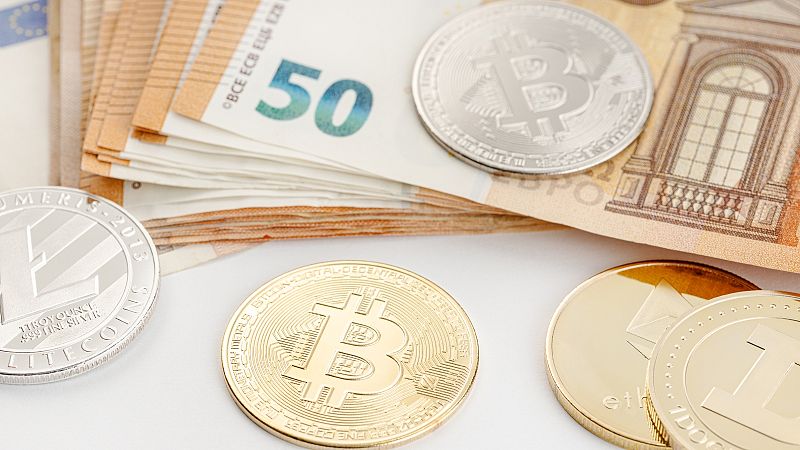Should European banks consider holding cryptocurrencies like Bitcoin as a reserve asset?

The Czech National Bank (CNB) recently launched an investigation into whether to invest in cryptocurrency or other digital assets.
The CNB said the bank would consider creating a Bitcoin test portfolio to "learn about and try out this highly risky alternative asset," as part of its ongoing diversification.
"Bitcoin is highly volatile and could one day be worth one of two extremes - either zero or a huge amount," Ales Michl, the bank’s governor, said in the statement.
Still, Michl said in a post on X that cryptocurrency is worth considering because it's not tied to bond prices and remains an "interesting asset for a large portfolio".
CNB is the first European central bank to evaluate crypto as a potential reserve asset, experts told Euronews Next. Could that change?
What is at stake for a central bank if it invests in crypto?
The role of a central bank is to manage a country's currency and control the money supply in circulation.
According to Matthias Bauer-Langgartner, Chainalysis’ head of policy for Europe, the banks also hold on to reserve assets as "effective tools" to help them establish monetary policies in their country.
Teunis Brosen, head of regulatory analysis at banking corporation ING, said central banks are generally very "conservative" with their investments by keeping a mix of government bonds, gold, cash, and selected foreign currencies.
Brosen and Bauer-Langgartner said the goal is stability and keeping assets liquid, so they can be sold quickly if needed. The banks also want to project an image of being strong and solid in case of an attack on the nation’s currency.
Not-so-stable crypto assets like Bitcoin that see major price and profit fluctuations are “at the other end of [that] asset spectrum,” Brosen said.
The value of Bitcoin has skyrocketed over 900 per cent in the last five years.
According to Google financial data, one Bitcoin was worth a low of €4,646 in March 2020 and is now priced at a whopping €91,828 at the time of writing.
However, that growth hasn’t been linear: Bitcoin’s value crashed twice in 2021 and several times in 2022 before taking off in 2024.
"The focus point of a central bank should never be to be profitable, but you know, obviously it doesn’t hurt either,” Bauer-Langgartner said. “I think there’s a certain drive [by Michl] to probably make sure there’s more efficient allocation of assets”.
One of the cautions against crypto investments is that they could cause some credibility issues, Brosens said, because citizens would be “basically forc[ed] [into] Bitcoin ownership” by the central bank.
"I’m worried about that because crypto is not yet a broadly established and accepted asset across the population," Brosens said. "That should not happen without proper democratic consideration".
The CNB and other central banks would have over 10,000 cryptocurrencies to choose from, but Bitcoin is the most "established" and the most liquid of all of them, Brosens said. Going for another type of crypto becomes "even more risky and shaky".
'Central banks can’t just invest in whatever they see fit'
There are some obstacles for the CNB if they decide to invest in cryptocurrency, Bauer-Langgartner said.
"Central banks can’t just invest in whatever asset they see fit," Bauer-Langgartner said. "It's a bit more complicated than that and often it requires legal and regulatory changes".
Once regulatory changes are cleared, the central bank would have to figure out how to buy crypto holdings "without completely distorting the markets and without driving the prices up dramatically," Brosens added.
The bank could work with a counterparty to buy cryptocurrency over a certain amount of time "in small chunks" to avoid any strong market effects, he continued.
The central bank would also have to decide just how much of their assets they’d like to invest.
Bauer-Langgartner said anywhere from 1 to 5 per cent could limit volatility but could also give some profit margins.
If the CNB were to go with a 5 per cent portfolio allocation for crypto, Brosens doesn’t expect the market to react negatively even if the price suddenly drops to zero.
"When exposure remains smallish, I don’t expect short-term a major impact," Brosens said. "If in the medium-term, Bitcoin goes to zero or drops a lot, that would mean losses for the CNB".
What that means in practice is that crypto losses or gains could feed directly into the government’s budget, Brosens said.
Possible pressure points with the European Central Bank
Shortly after the CNB announced its decision to investigate digital reserve assets, Christine Lagarde, Head of the European Central Bank (ECB), dismissed speculation that the ECB would follow suit.
"Reserves have to be liquid, secure, and safe," Lagarde said at a recent press conference, adding that Bitcoin is too volatile and risks connection to illicit activities like money laundering to meet this criteria.
Brosens believes the consensus by most European central banks "is still… the focus on stability, predictability over profitability".
If the CNB is to be the outlier, Bauer-Langgartner said there would likely have to be some "coordination efforts" between the ECB and the CNB.
The CNB is part of the European System of Central Banks, a group of all Europe's central banks whose mandate is to coordinate price stability.
However, the Czech Republic is not part of the eurozone, because it still uses the Czech koruna as an official currency.
"Operationally, I think they have a little bit more… wiggle room, but obviously it's the political angle that really needs to be discussed," Bauer-Langgartner said.
At the same time, the EU passed the Markets in Crypto-Assets (MiCA) law in 2023, which gives crypto a more defined legal framework and reduces the risks against fraud and market manipulation.
Bauer-Langgartner added that this legislation, along with renewed interest from the current US administration and Asian markets "fuels the discussion" about whether Bitcoin is a reliable asset.

